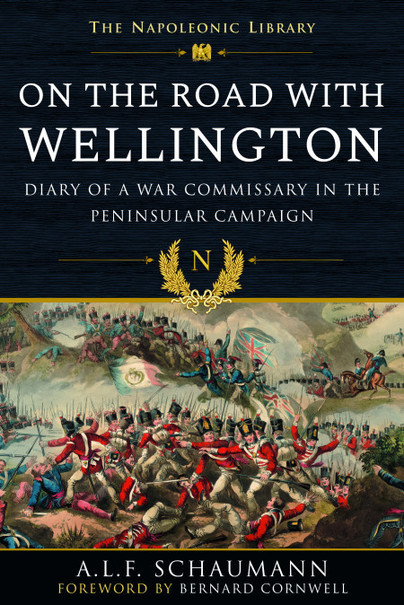Book
Review:
On the Road With Wellington
by August Schaumann

 If ever there is a book foreward to savour then August Schaumann's has to be one of the best on the literary menu.
If ever there is a book foreward to savour then August Schaumann's has to be one of the best on the literary menu.
Take this opening lines for his author's preface.
"Surely nothing is more affecting to a man than to recall all he experienced as a youth, and to think in later years of the pleasures he once enjoyed amid the dangers and upheavals of an adventurous life! Such thoughts lure him back to the spring and summer of his life; and, transfigured like fairy scenes, the early years of his manhood shine through the mists of the past."
And Schaumann's memories will definitely open your eyes to a much-ignored part of any army — the commissariat.
As a commissary officer he was a non-combatant and received neither honours nor orders.
But, as he points out: "Despite the fact I risked my life and my health in the discharge of my duties, nevertheless I maintain I deserved much more than many a combatant who strutted proudly about with his medals on his breast; for the zeal which we of the war commissariat showed was always multiplied in accordance with the difficulties we encountered."
Schaumann makes a great point and even this writer regularly overlooks the efforts made by these civilians to get food and war materiel to those fighting.
And he was — as many young men will be — a bit of a devil at times.
Near Zomosa in 1809 the army had to exchange its bullocks carts and Portuguese drivers, with Spanish ones.
They "were not as loyal as the Portuguese, for many ... deserted at once and left their bullocks in the lurch. Quartermaster Smith and I were very angry about this , for we had to run our legs off almost to pester the Spanish authorities before we could get others.
"Out of revenge we sold the bullocks and the carts to a butcher, who had a daughter who was so beautiful that, as Smith luaghingly assured me afterwards, I stood before her for quite a long time utterly speechless.
"We divided the spoil, and my share was all the more welcome to me, as I hadn't a penny to bless myself with."
Schaumann tells of the hardships faced in 1809 as the army moved towards Corunna.
"All the way from Salamanca snow and sleet fell day and night; the roads opffered no foothold, the swollen waters of the streams flooded the valleys and the plains, and turned them into swamps or bogs through which the whole army waded up to the knees.
"The transport wagons stuck, the soldiers' boots were torn from their feet and there was no fire to warm the men who were crippled with the wet and the cold, nor any fortifying nourishment either."
He describes part of the scene at Corunna.
"The firing was unusually fierce, and the thunder of guns roared incessantly. Again and again we were able to see the English regiments quite plainly charging the French at the point of a bayonet and with a loud cheer forcing them to run uphill under the protection of their guns.
"Among many wounded men who were borne past us into town there appeared at about four o'clock a party of several adies-de-camp and officers, mearching very slowly and sadly behind six soldiers bearing a wounded man in a blood-stained blanket slung between two poles.
"Two doctors walked on either side of the litter and repeatedlt cast anxious looks inside it.
"It was General Moore. A cannon shot had shattered his shoulder. He was still alive, but those who followewd him entertained no hope of his recovery."
At Talavera Schaumann writes: "A German sharpshooter of the 5th Battalion of the 60th Regiment, looking quite black oin the face from the sun, the dust, the gunpowder and perspiration, ran from the raging battle and flung himself on the ground in an exhausted condition, assuring me he had fired off 60 charges. His tongue was cleaving to his palate with thirst, he was unable to fight any longer and hardly 10 of his comopany were still alive."
Schaumann has so many adventures they cannot all be placed in a review but, among the more interesting — considering the times he was in — are his dalliances with the local ladies.
This book is a fabulous eye-opener about the early part of the Peninsular War, seen through the eyes of a particularly intelligent young man who is able to speak the truth as he witnessed it.
Huzzah for August Schaumann.
-
Richard Moore
9.5/10
On the Road With Wellington, by August Schaumann.
Frontline Books, ISBN: 978 1 848328396.
Pages: 416.
Illustrations: 1.